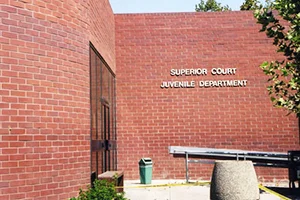Sylmar Juvenile Courthouse Overview
Court Address:
The Sylmar Juvenile Courthouse is located at:
16350 Filbert St., Sylmar, CA 91342
Phone Number:
For information on juvenile cases, detention hearings, or family-related court matters, contact the courthouse directly at:
(818) 365-7391
Hours of Operation:
The Sylmar Juvenile Courthouse is generally open:
Monday through Friday, 8:00 AM to 4:00 PM
Note: Certain departments may operate on varying schedules, so it’s always recommended to call ahead or check online for the most accurate information.
Website:
For detention hearing schedules, case lookups, visitation guidelines, and department contacts, visit the official Los Angeles County Courts website:
Sylmar Juvenile Courthouse Website
This overview provides the essential information for the Sylmar Juvenile Courthouse with the same structure and format as the Alfred J. McCourtney Juvenile Center page. Let me know if you’d like any further modifications!

Jurisdiction & Case Types – Sylmar Juvenile Courthouse
Jurisdiction Overview:
The Sylmar Juvenile Courthouse is a key facility within Los Angeles County dedicated exclusively to handling juvenile matters. It serves youth under the age of 18 who are involved in the legal system, emphasizing rehabilitation, accountability, and the involvement of families in the process. Unlike adult court systems, the juvenile court system is focused on the minor’s rehabilitation and reintegration into society rather than punishment.
Types of Juvenile Matters Handled:
- Delinquency Cases:
These cases involve criminal offenses allegedly committed by minors. The charges can range from misdemeanor-level offenses, such as theft or vandalism, to serious felonies like assault, robbery, or firearm possession. - Status Offenses:
These are non-criminal violations that only apply to minors. Common examples include:- Truancy (Skipping school)
- Breaking curfew
- Running away from home
- Incorrigibility (habitual disobedience to parents or guardians)
- Dependency Hearings:
These cases involve situations where a minor is alleged to be a victim of abuse, neglect, or abandonment. The court may step in to remove the child from unsafe conditions and assign temporary or long-term custody to a responsible party. - Probation Violations:
Juveniles who are on probation for a previous offense and are accused of violating the terms of their supervision may return to the Sylmar Juvenile Courthouse for hearings.
How Juvenile Court Differs from Adult Court in Los Angeles County:
Juvenile court focuses on the rehabilitation of minors rather than the punishment that is typically seen in adult court. Juvenile courts prioritize:
- Rehabilitation and behavioral support: Providing minors with the tools to correct their behavior and avoid further legal issues.
- Access to mental health and substance abuse programs: Ensuring that minors receive the necessary care and treatment.
- Educational assistance and life skills training: Helping minors achieve success in education and develop life skills to thrive.
- Supervised release, electronic monitoring, or placement in structured youth programs: Ensuring that minors are properly supervised while addressing their needs.
Judges at the Sylmar Juvenile Courthouse work closely with probation officers, social workers, and community-based organizations to help minors reintegrate into society and avoid reoffending.
How Bail Works at the Sylmar Juvenile Courthouse in Los Angeles
Bail Process Overview:
In juvenile cases, traditional bail does not typically apply in the same way it does for adult court cases. Instead, decisions about a minor’s release are made by the juvenile court judge or a supervising probation officer during a detention hearing. At the Sylmar Juvenile Courthouse, the focus is on determining whether the minor should be released to a parent or guardian, or whether they need to remain in custody until their next court hearing.
Bail Hearing:
A detention hearing is typically held within 48 to 72 hours (excluding weekends and holidays) after a minor’s arrest. During this hearing, a judge or probation officer will determine whether the minor can be released or if they must remain in custody. Since juvenile cases do not usually involve cash bail, the decision centers on other factors such as risk assessment, safety concerns, and the minor’s ties to the community.
Factors That Influence Release Decisions:
The judge or probation officer considers several important factors when determining whether a minor should remain in custody or be released:
Nature and Severity of the Alleged Offense:
Serious charges, such as robbery or firearm possession, may result in continued detention.
Prior History with Law Enforcement or Probation:
Minors with previous offenses or probation violations may face stricter supervision or detention.
Flight Risk:
If the judge believes the minor may fail to attend future court hearings, they may remain in custody or have stricter release conditions.
Home Environment & Parental Supervision:
The court will evaluate whether the minor has stable housing, good school attendance, and proper adult supervision at home.
Community Safety Concerns:
If the alleged offense poses a threat to public safety or the minor’s well-being, the court may decide to keep the minor in custody.
Alternative Release Options:
In cases where the judge determines that a minor should not remain in custody, alternative release options may be considered:
Release on Own Recognizance (OR):
The minor may be released without posting bail, with the understanding that they will return for future court hearings.
Supervised Release:
The minor may be released to a parent or guardian, but under conditions such as electronic monitoring, curfews, or probation supervision.
Electronic Monitoring (Ankle Bracelet):
In some cases, the minor may be required to wear an ankle bracelet for monitoring while they await their court hearings.
House Arrest or Placement in a Group Home:
If the court believes the minor can be safely monitored outside of detention, house arrest or placement in a structured program may be ordered.
Armstrong Bail Bonds Support:
While juvenile cases typically do not involve traditional bail, Armstrong Bail Bonds is here to support families through the process. Our team can:
Help coordinate with probation officers or legal counsel to facilitate release.
Provide guidance and support for families navigating juvenile court proceedings.
Offer 24/7 assistance to ensure your child can return home as quickly as possible.
Assist with reminders for upcoming court dates to ensure compliance with all legal requirements.


👩⚖️ Court Appearances & Visitation – Sylmar Juvenile Courthouse, Los Angeles
Court Appearance Responsibilities:
Defendants who are released from custody or under supervision are legally required to attend all scheduled court hearings at the Sylmar Juvenile Courthouse. Missing a court appearance can result in serious consequences, including the issuance of a bench warrant for the defendant’s arrest and potentially stricter release conditions or detention.
Why Court Attendance Matters:
Court hearings are a vital part of the juvenile justice process. Every scheduled hearing, whether it is an arraignment, detention hearing, or disposition hearing, moves the case forward and directly impacts the outcome. Defendants should:
- Arrive on time and be prepared for the hearing.
- Dress appropriately for court.
- Bring all necessary documents or evidence as requested by the court or their attorney.
- Maintain regular communication with their defense attorney and bail bondsman to ensure that all court requirements are met.
Consequences of Missing Court:
- If a minor fails to attend a scheduled court hearing, they may face:
- The issuance of a bench warrant for their arrest.
- Increased bail or detention time.
- Delays in the legal process, which can result in a longer stay in custody or extended supervision.
Inmate Visitation Guidelines (For Defendants in Custody):
If the minor is in custody while awaiting their court proceedings, they will typically be housed at a juvenile detention facility such as Barry J. Nidorf Juvenile Hall. The Sylmar Juvenile Courthouse does not directly handle inmate visitation. However, visitation can be arranged at the detention facility where the minor is being held.
- Visitation Hours & Scheduling:
- Visitation must be scheduled in advance through the specific detention facility where the minor is housed.
- Barry J. Nidorf Juvenile Hall is one of the most common facilities used for juvenile detainees in Los Angeles.
- Only approved family members or legal guardians are allowed to visit.
- For updated visitation rules and availability, it’s recommended to contact the facility directly.
- Visitation Contact Information:
- Barry J. Nidorf Juvenile Hall
Phone: (818) 364-2011
Address: 300 Sylmar Park Road, Sylmar, CA 91342
- Barry J. Nidorf Juvenile Hall
- Visitor Rules & Requirements:
Visitors must comply with facility rules to ensure safety and security:- A valid government-issued ID is required for all visitors.
- Appropriate clothing must be worn; revealing or gang-related clothing is prohibited.
- Personal items such as phones, food, and bags are generally not allowed inside the facility.
- Visitors must remain calm and respectful; any disruptive behavior may result in denial or cancellation of the visit.
For more details, it’s recommended to contact Barry J. Nidorf Juvenile Hall for specific visitation rules and schedules.
Common Charges Handled at the Sylmar Juvenile Courthouse – Los Angeles
The Sylmar Juvenile Courthouse processes a wide variety of juvenile criminal cases, ranging from minor offenses to serious felonies. Below are some of the most common charges brought before this courthouse:
Criminal Charges:
Drug Offenses:
Possession of Controlled Substances: Including marijuana (above legal limits), cocaine, methamphetamine, heroin, and other illegal drugs.
Possession with Intent to Sell: When a minor is caught with a large quantity of drugs, indicating the possibility of distribution.
Drug Trafficking & Distribution: Involves the sale, transportation, or distribution of illegal substances.
Driving Under the Influence (DUI): Driving under the influence of drugs or alcohol, even for minors.
Theft & Property Crimes:
Petty Theft & Shoplifting: Stealing items valued at $950 or less, commonly occurring in stores.
Grand Theft: Stealing property valued over $950 or involving motor vehicle theft.
Burglary: Entering a structure or vehicle with the intent to commit theft or vandalism.
Vandalism & Graffiti: Defacing property or public spaces, including school walls or personal property.
Violent Crimes:
Assault & Battery: Physical violence or threats of violence, ranging from simple battery to more serious offenses like aggravated assault.
Robbery: Stealing property using force or intimidation, often involving a victim.
Manslaughter: The unlawful killing of another person without premeditation or intent.
Sex Crimes:
Rape & Sexual Assault: Any form of non-consensual sexual activity or behavior, including molestation and assault.
Child Abuse & Molestation: Cases involving minors as victims of sexual or physical abuse.
Indecent Exposure & Lewd Acts: Public indecency charges involving inappropriate or criminal sexual behavior in public.
Weapons Offenses:
Possession of a Firearm or Knife: Carrying weapons, including guns or knives, without proper authorization.
Assault with a Deadly Weapon: Using a weapon (including firearms, knives, or other objects) to threaten or harm another person.
Carrying a Concealed Weapon: Carrying an illegal weapon in public, either concealed or openly.
Status Offenses:
Truancy (Skipping School): Minors who are repeatedly absent from school without legitimate reason can be brought before the court for habitual truancy.
Breaking Curfew: A minor who violates the mandated curfew can face legal consequences.
Running Away from Home: A minor who leaves home without parental consent may be treated as a status offender.
Incorrigibility: Cases involving minors who repeatedly defy parental authority or disobey lawful commands of a guardian.
Probation Violations:
Violation of Probation Terms: Minors who violate the terms of their probation, such as committing a new offense or failing to comply with court orders (e.g., attending school, counseling, or community service), will face hearings in the juvenile court.
Frequently asked questions about Sylmar Juvenile Courthouse
Where is the Sylmar Juvenile Courthouse located?
The Sylmar Juvenile Courthouse is located at:
16350 Filbert St., Sylmar, CA 91342. This courthouse handles juvenile matters in the northern region of Los Angeles County.
What types of cases are handled at the Sylmar Juvenile Courthouse?
The Sylmar Juvenile Courthouse handles juvenile delinquency cases, status offenses, dependency hearings, and probation violations for minors under the age of 18.
How soon will a minor see a judge after being arrested?
A minor will typically have a detention hearing within 48 to 72 hours (excluding weekends and holidays) after being arrested. This hearing determines whether the minor will be released or held in custody until further court proceedings.
Is there bail for juvenile cases at Sylmar Juvenile Courthouse?
Juvenile cases do not use traditional bail. Instead, the court will decide whether the minor can be released to a parent or guardian or if they need to remain in custody pending further hearings. Armstrong Bail Bonds can assist with coordinating the release process.
What happens if my child misses court?
Missing a scheduled court appearance can result in serious consequences, including the issuance of a bench warrant for arrest, the revocation of bail (if applicable), and possible increased detention time or stricter probation terms.
Can I visit my child at the Sylmar Juvenile Courthouse?
The Sylmar Juvenile Courthouse does not facilitate inmate visitation. However, if your child is held at a detention facility such as Barry J. Nidorf Juvenile Hall, you may be able to schedule visitation there. Visits must be scheduled in advance, and approval is required.
What should I bring to court?
Defendants should bring any documents or evidence requested by the court or their attorney, such as identification, school records, proof of employment, or counseling records. It’s also important to dress appropriately and arrive on time.
How do I pay for bail?
Armstrong Bail Bonds offers several payment options for securing the release of a minor, including credit cards, debit cards, bank transfers, and cash. We also provide flexible payment plans for families.
Can Armstrong Bail Bonds help if there’s no bail?
Yes, even though traditional bail does not apply in juvenile cases, Armstrong Bail Bonds can help coordinate with probation officers and provide assistance with detention hearings, court reminders, and other legal processes.
How do I get help from Armstrong Bail Bonds?
You can reach Armstrong Bail Bonds 24/7 by calling (818) 241-2171. Our team is here to help you navigate the juvenile court process and provide reliable support throughout your case.



